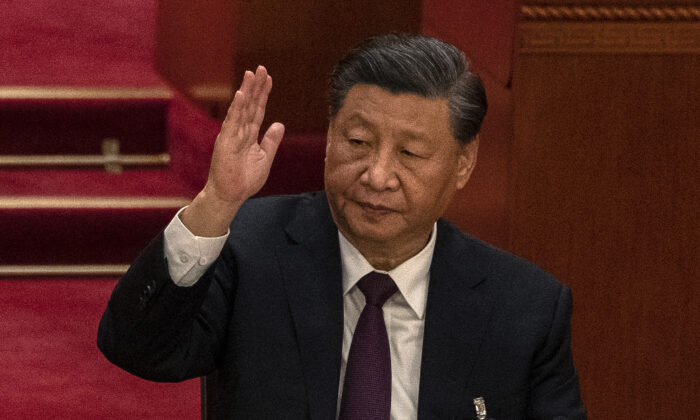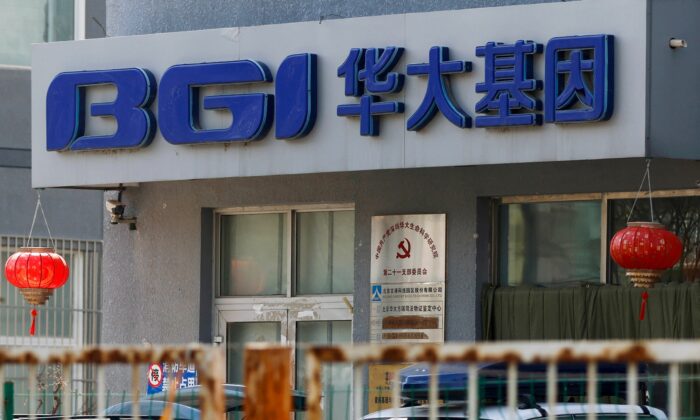March 8, 2023Updated: March 8, 2023
Chinese Leader Xi
Jinping raises his hand as he votes during the closing session of the 20th
National Congress of the Chinese Communist Party at The Great Hall of People in
Beijing, on Oct. 22, 2022. (Kevin Frayer/Getty Images)
The Chinese Communist
Party has been stealing U.S. intellectual property for years, costing Americans
up to $600 billion annually, the equivalent of $6,000 for every family, an
expert testified on Capitol Hill on March 8.
The theft has been
systematic, deliberate, and obvious—but not adequately addressed by the federal
government, witnesses said.
“When it comes to
intellectual property, the Chinese Communist Party has been eating our lunch
for many years across both parties’ administrations,” Rep. Ben Cline (R-Va.)
said, then corrected his comment.
“I think it needs to be
changed to, ‘They’ve been stealing our lunch money and parading in front of
us.’”
To stop the thievery, the
United States must employ a multidimensional strategy that begins with
developing a bipartisan, societal will to confront the problem, experts said.
The testimony came at a
hearing of the House Judiciary Subcommittee on Courts, Intellectual Property,
and the Internet on March 8, during which members of both parties acknowledged
the ongoing theft of U.S. intellectual property and resolved to find a
solution.
Uncivil
Actions
The United States has
embraced trade with China since President Richard Nixon reestablished
diplomatic relations with the country in 1972.
While generally
beneficial, the open trading relationship hasn’t produced the hoped-for
moderating effect on the behavior of the Chinese Communist Party (CCP),
subcommittee chairman Darrell Issa (R-Calif.) said.
“American national
security is at risk because of China’s government’s quest to achieve
superiority using both internal and external gotten technology” through both
legal and illegal means, Issa said.
Ranking Member Hank
Johnson (D-Ga.) agreed with the assessment.
“We know that the sale
scale of China’s IP theft is enormous. We know that it hurts our inventors’
ability to compete and succeed,” Johnson said.
“And we know that we need
to improve our laws and policies to not only protect America’s intellectual
property from the Chinese government but also to mitigate the damage already
done.”
Johnson and other
speakers noted that U.S. competitiveness with China shouldn’t fuel anti-Asian
racism.
“We are in an innovation
war with China. But we don’t win that war by giving our values and giving in to
hate,” Johnson said.
Anything
Not Nailed Down
Witnesses described the
CCP’s IP theft program as a “whole society” approach.
“China uses intelligence
services, science and technology investments, academic collaboration, research
partnerships, joint ventures, front companies, mergers and acquisitions, and
outright theft via insider threats and cyber intrusions,” said William Evanina,
founder and CEO of the Evanina Group, a consulting firm specializing in
intellectual property security.
China steals pretty much
“everything” having to do with intellectual property, he said.
The list is “clear,
concise, at the same time strategic and comprehensive. Just to name a few:
aerospace deep-sea technology, biotechnology, information technology,
manufacturing, clean energy, electric battery technology, and DNA genomics,” he
said.
Chinese company Comac’s
C929 airplane, to be debuted next month, was created almost entirely with
stolen technology, Evanina said.
Addressing
Vulnerabilities
Predatory use of patent
laws is a primary tactic of Chinese companies, witnesses said.
Chinese companies will
steal U.S. ideas and innovations, sometimes aided by state laws prohibiting
noncompete contracts, then obtain patents on the work and sue the innovating
U.S. company for patent infringement.
To combat that, the U.S.
patent process should be improved to ensure that patents are correctly reviewed
and that legal enforcement is fair both here and in China, according to Charles
Duan, a professor at American University Washington College of Law and a member
of the U.S. Patent and Trademark Office’s public advisory committee.
Joint ventures between
Chinese and U.S. companies have also provided opportunities for intellectual
property theft.
“We don’t play by the
same rules as the Communist Party of China,” Evanina said.
While acknowledging that
U.S. investment in Chinese countries is legal and often lucrative, Evanina
asked business leaders to weigh the trade-off between profit and national
security.
“We are in a place right
now where our global supremacy, our capitalist mindset is clearly superseding
and overlapping with our national security interests,” he said.
Tech innovators and
research institutions aren’t the only points of vulnerability. Social media
apps are another, especially those that send data back to the app makers, many
of which are based in China.
“This is really a matter
of evaluating the backdoor risks that are posed. I think we need to do a better
job of that,” said Mark Cohen, distinguished senior fellow and director of the
Asia IP Project at Berkeley Center for Law and Technology.
Previous attempts to
reform the behavior of the CCP by multiple administrations have failed. The
starting point for any future attempt is to develop a bipartisan,
public-private approach to the problem, according to Evanina.
“You have to have the
political will across parties and administrations and, importantly, in the U.S.
business community,” he said.
“Absent the sustained
will, it will be increasingly difficult to protect the U.S. economy and
American workers from the negative impact of Chinese policies and practices on
[intellectual property].”
US Blacklists 37
Companies, Including China’s BGI, Inspur
By Reuters
March 6, 2023Updated: March 6, 2023
The logo of Chinese gene firm BGI Group at its building in Beijing, on March 25, 2021. (Carlos Garcia Rawlins/Reuters)
The Biden administration
on Thursday added 37 companies to a trade, including units of Chinese genetics
company BGI and Chinese cloud computing firm Inspur, in a move that promises to
further ratchet up tensions with Beijing.
The Commerce Department,
which oversees export controls, added BGI Research and BGI Tech Solutions
(Hongkong), over allegations that the units pose a “significant risk” to
contributing to the Chinese Communist Party’s (CCP) surveillance.
“The actions of these
entities concerning the collection and analysis of genetic data present a
significant risk of diversion to China’s military programs,” it said.
Reuters previously
reported BGI was collecting genetic data from millions of women for sweeping
research on the traits of populations, and collaborates with the Chinese
military.
Also listed was BGI’s
forensics subsidiary, Forensics Genomics International.
The Commerce Department
accused Inspur of acquiring and attempting to acquire U.S. goods to support the
CCP’s military modernization efforts.
The companies and the
Chinese embassy in Washington did not immediately respond to requests for
comment.
Commerce added 26 other
Chinese entities to the list—which makes it hard for targeted companies to
receive shipments of U.S. goods from suppliers.
The additions included
several entities Commerce said were supplying or attempting to supply a
sanctioned entity in Iran, and three firms in Russia, Belarus, and Taiwan that
Commerce said were contributing to Russia’s military.
It also targeted
companies in China and Burma (also known as Myanmar) for violations of human
rights, and went after companies in China and Pakistan for contributing to
ballistic missile programs of concern, including Pakistan’s.
“When we identify
entities that pose a national security or foreign policy concern for the United
States, we add them to the Entity List to ensure we can scrutinize their
transactions,” Assistant Commerce Secretary Thea Kendler said in a statement.
The latest additions to
the trade blacklist are likely to further escalate ill will between Washington
and Beijing, which have been locked in a technology war for years.
Tensions have been
especially high since the Biden administration last month shot down a Chinese
spy balloon that had crossed a broad swath of the United States.
“We cannot allow our
adversaries to misuse and abuse technology to commit human rights abuses and
other acts of oppression,” said Assistant Secretary of Commerce for Export
Enforcement Matthew Axelrod. “That’s why we’re committed to preventing bad
actors from siphoning off our technology. We will take an all-tools approach to
combat this threat.”
In 2020, the Commerce
Department added two units of BGI Group, the world’s largest genomics company,
to its economic blacklist over allegations it conducted genetic analyses used
to further the repression of China’s minority Uyghurs.
Beijing has denied wrongdoing.
BGI denied allegations of wrongdoing at the time.
By Alexandra Alper and David Shepardson
https://www.theepochtimes.com/us-adds-units-of-chinas-bgi-inspur-to-trade-blacklist_5101916.html





No comments:
Post a Comment